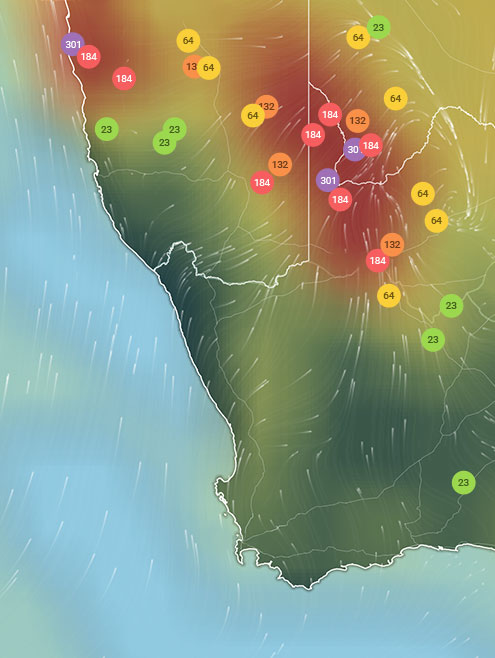Get a monitor and contributor to air quality data in your city.
2.4K people follow this city






AIR QUALITY DATA CONTRIBUTORS
Find out more about contributors and data sources| Index | Very high | ||
| Tree pollen | Very high | ||
| Grass pollen | None | ||
| Weed pollen | None |
| Weather | Broken clouds |
| Temperature | 48.2°F |
| Humidity | 69% |
| Wind | 1 mp/h |
| Pressure | 29.8 Hg |
| # | city | US AQI |
|---|---|---|
| 1 | Magenta, Lombardy | 60 |
| 2 | Ravenna, Emilia-Romagna | 58 |
| 3 | Pavia, Lombardy | 57 |
| 4 | Naples, Campania | 53 |
| 5 | Milano, Lombardy | 48 |
| 6 | Falconara Marittima, The Marches | 47 |
| 7 | Piacenza, Emilia-Romagna | 46 |
| 8 | Padova, Veneto | 45 |
| 9 | Rome, Latium | 43 |
| 10 | Bergamo, Lombardy | 42 |
(local time)
SEE WORLD AQI RANKING
| # | station | US AQI |
|---|---|---|
| 1 | Bolzano - Via C.Augusta | 34 |
| 2 | Bolzano - Via Amba Alagi giardino | 28 |
| 3 | Bolzano - Piazza Adriano | 15 |
(local time)
SEE WORLD AQI RANKINGUS AQI
29
live AQI index
Good
| Air pollution level | Air quality index | Main pollutant |
|---|---|---|
| Good | 29 US AQI | O3 |
| Pollutants | Concentration | |
|---|---|---|
| PM2.5 | 5.9µg/m³ | |
| PM10 | 9.3µg/m³ | |
| O3 | 71.2µg/m³ | |
| NO2 | 8µg/m³ | |
PM2.5
x1.2
PM2.5 concentration in Bolzano-Bozen is currently 1.2 times the WHO annual air quality guideline value
| Enjoy outdoor activities | |
| Open your windows to bring clean, fresh air indoors GET A MONITOR |
| Day | Pollution level | Weather | Temperature | Wind |
|---|---|---|---|---|
| Wednesday, Apr 24 | Good 31 AQI US | 59° 33.8° | ||
| Thursday, Apr 25 | Good 32 AQI US | 57.2° 33.8° | ||
| Friday, Apr 26 | Good 29 AQI US | 59° 39.2° | ||
| Today | Good 29 AQI US | 59° 44.6° | ||
| Sunday, Apr 28 | Good 40 AQI US | 62.6° 48.2° | ||
| Monday, Apr 29 | Good 44 AQI US | 75.2° 50° | ||
| Tuesday, Apr 30 | Moderate 53 AQI US | 75.2° 50° | ||
| Wednesday, May 1 | Moderate 56 AQI US | 68° 51.8° | ||
| Thursday, May 2 | Good 49 AQI US | 66.2° 53.6° | ||
| Friday, May 3 | Good 22 AQI US | 69.8° 50° |
Interested in hourly forecast? Get the app
Bolzano is the capital city of the province of South Tyrol in northern Italy. According to a census conducted in March 2018, Bolzano had an estimated population of approximately 108,000 people. When the greater metro area is included, this figure rises to 250,000 inhabitants.
Towards the end of 2021, Bolzano was experiencing a period of “Moderate” air quality with a US AQI reading of 81.
This United States Air Quality Index number is calculated using the levels of six of the most prolific air pollutants, such as nitrogen dioxide, sulphur dioxide, ozone, carbon monoxide and both sizes of particulate matter, which are PM2.5 and PM10. It can then be used as the metric when comparing air quality in other cities around the world. If data is unavailable for all 6 pollutants, a figure can still be calculated by using what figures there are. In Bolzano, four of these prolific pollutants were measured. These were; PM2.5 - 26.6 µg/m³, PM10 - 34 µg/m³, ozone (O3) - 1.7 µg/m³ and nitrogen dioxide (NO2) - 51.5 µg/m³.
This level of PM2.5 is just over two and a half times above the recommended safe level of 10 µg/m³ as suggested by the World Health Organisation (WHO) as being an acceptable level. Although no amount of air pollution is considered to be safe.
When the level of pollution is classified as being “Moderate” the given advice would be to remain indoors as much as possible, closing windows and doors to prevent more polluted air from entering. Those of a more sensitive disposition should avoid outdoor exercise until the air quality improves. If this is unavoidable then a good quality mask should be worn at all times. For up-to-date information about air quality, there is an app available from AirVisual.com which is downloadable for all mobile devices. This shows the air quality in real-time.
Air quality can be very volatile because it can be affected by many variables.
Looking back at the 2020 figures published byIQAir.com, it can easily be seen that from May until the end of October, Bolzano achieved the WHO target figure of being less than 10 µg/m³. The month with the best quality air was June with a reading of 7.6 µg/m³. March produced the next best quality air with a “Good” reading of 10.3 µg/m³. The remaining five months saw air quality from the “Moderate” category with figures between 12.1 and 35.4 µg/m³.
Records pertaining to air quality were first kept in 2019 when a figure of 11.3 µg/m³ was recorded. This declined slightly in 2020 when the recorded figure was 11.7 µg/m³. However, this reading may have been affected by the COVID-19 pandemic as many vehicles were no longer in daily use because the offices were closed, in an attempt to halt the spread of the virus. Many factories and non-essential production units were also required to close which removed their emissions from the atmosphere, albeit on a temporary basis.
The air in our Bolzano is mainly polluted by car exhausts. Even the transport of children to schools is often carried out by car, which produces strong environmental impacts, especially in the morning rush hour.
In South Tyrol, the challenge to be faced to improve air quality is the reduction of nitrogen dioxide (NO2) caused by traffic, especially from vehicles with diesel engines.
The nitrogen dioxide program 2018-2023 is strongly targeting structural measures to reduce vehicular traffic, which is the main source of NOx emissions of nitrogen oxides that generate high levels of nitrogen dioxide. In particular, we want to encourage all forms of sustainable mobility, from cycling to electric mobility, from public transport to the “intelligent” management of vehicle flows. In this program, therefore, the commitment of the Municipalities is also foreseen, which are therefore called to implement structural measures for sustainable mobility by introducing effective measures to reduce motorized traffic in their mobility management plans.
To reduce the problem of transport-related air pollution, the number of vehicles with combustion engines, the main source of emissions in Italian cities, must decrease. This means encouraging electric cars, which, in addition to not being harmful to health, are much more environmentally friendly. No public funds must be allocated to diesel, petrol or gas vehicles, even in the form of a tax credit. Taxpayers' money must not be used to put other polluting vehicles into circulation.
Air pollution is an accepted cause of ailments and premature deaths. The greatest danger is represented by the considerable disturbances generated by fine dust and ozone.
With each breath we take, gases such as nitrogen dioxide and ozone as well as thousands of fine particles (PM2.5 and PM10) enter our airways and our lungs. These pollutants can travel to the bronchi and alveoli, where, in the short or long term, they can have adverse health effects. From the alveoli, they can transfer into the bloodstream.
The finer the particles, the deeper they penetrate the lungs. Excessive concentration of these substances increases the frequency of respiratory tract disorders and affections in both children and adults.
For example, episodes of dyspnoea, chronic cough and phlegm, acute and chronic bronchitis, respiratory tract infections may occur. The symptoms will be much worse for those with pre-existing disorders.
Air pollution also contributes to aggravating these ailments in people who already suffer from it. The more polluted the air, for example near busy roads, the greater the frequency with which attacks occur. Polluted air causes a reduction in average lung capacity and, consequently, an increase in urgent medical interventions and hospital admissions due to respiratory tract diseases.
Life expectancy is reduced: in fact, daily deaths from cardiovascular and respiratory disorders or lung cancer increase.
Air pollution is linked to premature deaths, most of which are due to cardiovascular disease. Fine particles can damage the cardiovascular system in many ways, causing inflammation, promoting blood clotting, narrowing the arteries, putting the heart under stress. Our research shows that the smallest nanoparticles (about the size of those found in diesel engine exhausts) can be inhaled and then pass from the lungs into the blood. After that they can be carried throughout the body, and accumulate in different organs.
1Contributor
Government Contributor
3 stations
2 Data sources